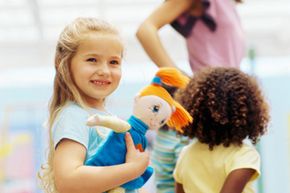 “Keep your kid’s immunizations up to date and the hand sanitizer close, as nothing’s foolproof.Stockbyte/Thinkstock
“Keep your kid’s immunizations up to date and the hand sanitizer close, as nothing’s foolproof.Stockbyte/Thinkstock
In a perfect world, no one would get the colds, flu, pink eye, head lice or anything else that seems to incubate among groups of little ones. Keeping kids healthy at daycare is a nearly impossible goal but here are a few suggestions that may help.
Contents
- The "Hygiene Hypothesis"
- Wash Your Hands
- Know Who's At Risk
- Accidents Happen
- Choose a Licensed Daycare Provider
5: The "Hygiene Hypothesis"
Kids in daycare are generally known to be at higher risk for sickness than kids who are cared for at home. It’s the exposure to all those kids and their germs that’s the problem — and apparently, could also be the solution, according to some studies.
It’s known as the "hygiene hypothesis" and here’s the deal: While it sounds perfectly sensible to keep your environment as clean as possible and shield kids from germs, some studies also hypothesize that exposure to the very germs we try to avoid can help kids develop strong immune systems.
One recent study, done by scientist Erika Von Mutius and featured on PBS, found that children who are exposed to other kids early in life are exposed to more microbes, which might help their immune systems develop more tolerance for the irritants that cause asthma.
Of course, this is only a theory and parents should always consult a doctor regarding any germ or allergen exposure.
Did You Know?
According to the American Lung Association asthma affects more than 6 million American kids and is the most common chronic childhood disorder.
4: Wash Your Hands
Do you know how to wash your hands? Soap, water and towel dry, right? Basically yes, but most of us are still doing it wrong. To properly wash your hands, you should use warm water and soap and scrub thoroughly (don’t forget under those fingernails). Do this for about the amount of time it takes you to sing Happy Birthday.
How often? It depends. Of course, you should always wash your hands after changing a diaper or using the bathroom. Always wash your hands before eating or handling food. And while going about your daily work or business, keep an eye on what you touch and avoid putting your hands in mouth, nose and eyes.
Can’t wash your hands? Keep a bottle of hand sanitizer handy — as long as your hands aren’t visibly dirty it’ll do the trick.
And teach your kids the same habits. They’re more likely to do it at daycare if they are used to the routine with you!
Did You Know?
The two most common illnesses found in kids in daycare are viral upper respiratory and gastrointestinal infections.
3: Know Who's At Risk
Some kids need a little extra attention at daycare: Kids with chronic illness, weakened immune systems and food allergies are at greater risk from germs than the rest of the daycare gang. Food allergies can also present a severe or possibly life-threatening reaction.
It’s important for parents to report all health issues to their child’s caregiver — anything from a new food allergy to a cold — immediately. And in the case of food allergies or special needs, be sure there is a management plan in place. Knowledge is power and letting caregivers know could minimize the spread of germs to other kids.
Did You Know?
Food allergies affect more than 3 million kids in the U.S. alone.
2: Accidents Happen
Most accidents at daycare happen because of lack of supervision, on the playground or inside. Children should always be supervised — ideally you should look for a provider with a child-to-staff ratio of 3:1 for infants, 4:1 for 2-year-olds and 7:1 for 3-year-olds.
No matter how much you try, though, every parent knows you just can’t protect kids from the occasional accident on the playground or at daycare — or anywhere for that matter. Teaching kids how to keep themselves safe at daycare and avoid taking unnecessary risks may help. However, unsafe premises, inadequate security and lack of supervision are serious problems and should be immediately addressed.
1: Choose a Licensed Daycare Provider
One way to keep kids safe at daycare is by selecting a provider who is licensed and undergoes regular facility inspections. Look for professionalism, cleanliness and ask plenty of questions about the center’s plan for dealing with sick kids. Daycare centers should require both kids and caregivers to be immunized.
When you visit survey the area. Foods should be properly stored and refrigerated, toys should be clean and cleaning products should be locked up tight. There should be guards on windows and near any stairs to protect little ones from falls. And you should see smoke detectors and fire extinguishers and an emergency evacuation plan.
Lots More Information
Related Articles
- Top 10 Home Safety Tips for Kids
- Top 10 Picky Eater Tips
- 10 Ways Not to Catch Your Kid’s Cold
- 10 TV Moms We Secretly Want to Be





























